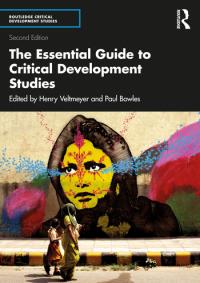Dario Azzellini
Workers’ Control and Self-Management

Autor: Veltmeyer, Henry; Bowles, Paul (Eds.)
Publisher: Routledge
Páginas: 442
Published in 2022
https://www.routledge.com/The-Essential-Guide-to-C...
43. Workers’ Control and Self-Management
Dario Azzellini
Workers’ control and workers’ self- management have manifested themselves in all kinds of crisis and historical changes. They proliferated in revolutions and anti-colonial struggles, during political, economic, social, and cultural crises, and as a response to capitalist restructuring. Different forms of and struggles for workers’ control and self-management occurred in capitalist and in declared socialist political systems. In the Global South, workers’ control was especially present in anti-colonial and postcolonial emancipation efforts from the late 1940s to the early 1980s. Over the past two decades there has been a renewed global interest in workplace democracy, cooperativism, and workers’ control. The contemporary crisis has put self-management and the control of the means of production by workers and communities back on the agenda in many different forms. From a growing cooperative movement in many countries, struggles for the collective democratic administration of resources as commons to workplace takeovers through workers (from radical models as in Latin America and beyond to workers’ buy-outs) and the broader societal practices of the Zapatistas in Chiapas, the Communes in Venezuela, and Rojava/Kurdistan. This chapter clarifies some conceptual differences, and looks at the history of workers’ control and workers’ self-management, focusing especially on the Global South. It summarises why larger-scale initiatives in the 20th century failed and looks especially at the Worker Recuperated Companies as a 21st-century phenomenon to analyse the anticapitalist and emancipatory potential of workers’ control.
Table of Contents
CRITICAL DEVELOPMENT STUDIES: AN INTRODUCTION
1. Introduction to Critical Development Studies: Four Characteristics with Illustrations from Seven Decades
Paul Bowles and Henry Veltmeyer
PART 1: HISTORY AS DEVELOPMENT
2. Unravelling the Canvas of History
Kari Polanyi Levitt
PART 2: THINKING CRITICALLY ABOUT DEVELOPMENT
3. Critical Development Theory: Results and Prospects
Ronaldo Munck
4. Race in/and Development
Robtel Neajai Pailey
5. Development Theory: The Latin American Pivot
Cristóbal Kay
6. Postdevelopment and Other Critiques of Development
Eduardo Gudynas
7. Feminist Contributions to Critical Development Studies
Fernanda Wanderley
PART 3: SYSTEM DYNAMICS: CAPITALISM, IMPERIALISM, DEVELOPMENT AND GLOBALIZATION
8. Capitalism and Crises
Radhika Desai
9. Development, Capitalism, Imperialism, Globalisation: A Tale of Four Concepts
Henry Veltmeyer
10. Globalisation Versus Development: Beyond Dualism
S.A. Hamed Hosseini and Barry K. Gills
11. Philanthrocapitalism and Development
Andrew Mushita and Carol Thompson
12. The Migration-Development Nexus in the Neoliberal Era
Raúl Delgado Wise
PART 4: POLICY CONFIGURATIONS FOR DEVELOPMENT
13. The Post-Washington Consensus
Elisa Van Waeyenberge
14. International Cooperation for Development
Peter Kragelund
15. The Developmental State, Globalisation and Structural Transformation
Paul Bowles
16. Local Economic Development, Microcredit and Financial Inclusion
Milford Bateman
PART 5: INSIDE THE BRICS
17. Brazil: Development Strategies and Peripheral Conditions
Ana Garcia and Miguel Borba de Sá
18. India: Critical Issues of a ‘Tortuous Transition’
John Harriss
19. Interrogating the China Model of Development
Yin-Wah Chu and Alvin Y. So
20. South Africa: An Economy of Extremes
Sam Ashman
PART 6: POVERTY, INEQUALITIES AND DEVELOPMENT DYNAMICS
21. Development: Class Matters
Henry Veltmeyer
22. The Dynamics of Poverty Production: A Political Economy Perspective for the SDGs Era
Alberto D. Cimadamore
23. Poverty Analysis through a Gender Lens
Naila Kabeer
24. Women, Work and Gender Inequalities: With Illustrations from Cambodia and China
Fiona MacPhail
25. Health Inequalities and Development in a Global Context
Ted Schrecker
PART 7: CAPITALISM, LABOUR AND THE STATE
26. Labour and Development
Benjamin Selwyn
27. The Triangle of Underdevelopment: Technology, Patents and Monopoly
Edgar Záyago Lau
28. The Making of the New Chinese Working Class
Pun Ngai
29. Labour and Development in Latin America
Susan Spronk
30. Class and State Formation in the Gulf Arab States
Adam Hanieh
PART 8: DYNAMICS OF AGRARIAN CHANGE AND URBAN DEVELOPMENT
31. Contemporary Dynamics of Agrarian Change
Cristóbal Kay
32. Food Regimes and Agrarian Questions
Haroon Akram-Lodhi
33. Urban Development in the Global South
Charmain Levy and Alice Moura
34. Peasant Alternatives to Neoliberalism
Leandro Vergara-Camus
PART 9: DEVELOPMENT, CLIMATE CHANGE, AND THE ENVIRONMENT
35. Eco-Marxist Lenses for Viewing Human-Nature Relations
Darcy Tetreault
36. Climate Change and Development
Marcus Taylor
37. The Energy Transition and the Global South
Leandro Vergara-Camus
38. The Political Economy of Extractivism in North Africa
Hamza Hamouchene
PART 10: RESISTANCES AND ALTERNATIVES
39. Understanding the Rise of the Far Right, and what to do about it
Walden Bello
40. Rural Dispossession and Resistance in Asia and Africa
Dip Kapoor
41. Extractive Capitalism and the Resistance in Latin America
Raúl Zibechi
42. Colonialism’s Miasmas: Indigenous Resistance and Resilience
Makere Stewart-Harawira
43. Workers’ Control and Self-Management
Dario Azzellini
44. Communitarian Revolutions: Ecological Economics from Below
David Barkin
CONCLUSION
45. Moving towards Another World: Possibilities and Pitfalls
Henry Veltmeyer























